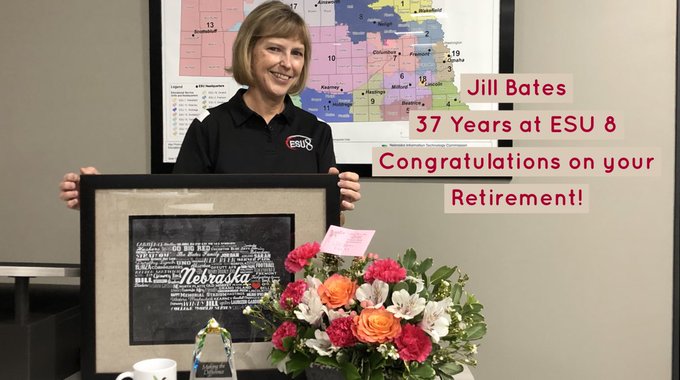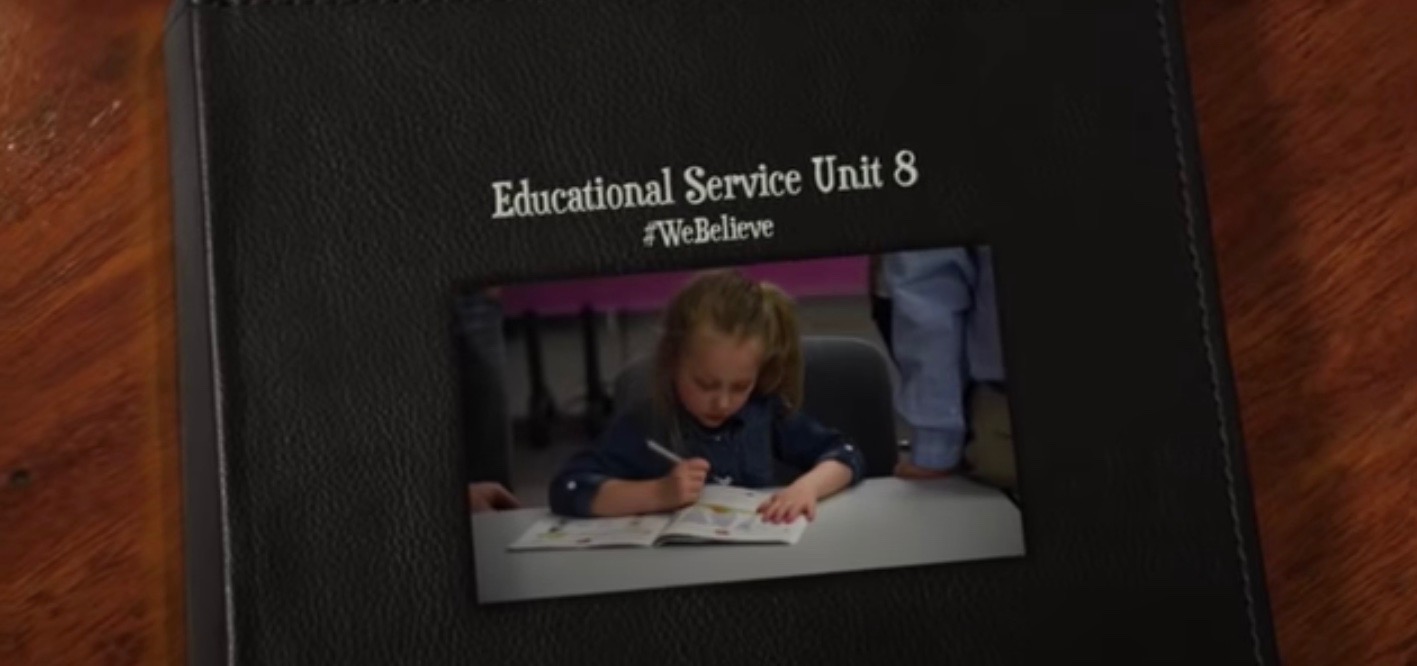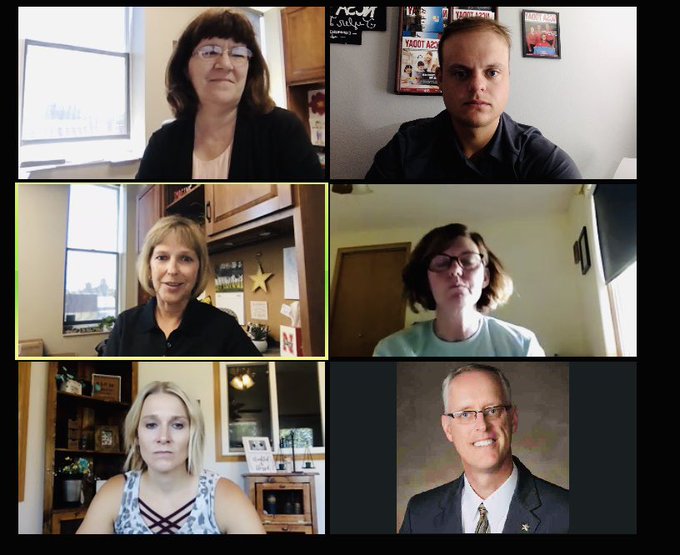Service Units Support: Forward-thinking, innovation fuels ESU 8's pandemic relief efforts
Service Units Support: Forward-thinking, innovation fuels ESU 8's pandemic relief efforts
By Tyler Dahlgren
Jill Bates admits that this is an interesting way to end a memorable career at Educational Service Unit 8--one that spanned 37 years--occupying one of six squares on the screen of a virtual web conference in the middle of a historic pandemic.
This setting has grown almost too familiar since mid-March, when COVID-19 forced school closures across the globe. Bates, ESU 8’s Assistant Administrator, would much rather be sitting around a table in the service unit’s Neligh offices. She’d much rather spend the final stretch of four decades in education with the people who have made that run so special.
“This has been a very unusual way to end a career, not being able to see our staff in person, and basically ending my career via Zoom," she concedes, before transitioning to a lighthearted joke. "I’m Zooming into retirement, I guess.”
It’s been an unusual period in time for everybody in education. For everybody, period. But in this 45-minute discussion, the group brings to light an extensive list of supports, innovation and an out-of-the-box way of serving 19 districts that ESU 8 has efficiently integrated into its mission.
“We’ve been very proactive in everything we’ve done,” Bates said. “I’m actually sad to retire because I’m not going to be around to see exactly what’s going to happen when school starts back up in August.”

Unusual doesn’t necessarily mean meaningless. Quite the contrary, actually.
“Our communication has increased because of all of this, quite honestly,” said ESU 8 Administrator Corey Dahl, whose first year in that role was one to remember. “We’re all in the same boat. It’s been nice to work together with everyone from across the state, whether it’s service unit people or administrators or superintendents. We’ve all collaborated and shared in this together.”
This is Dahl’s second stint at ESU 8, where he previously worked for eight years. He’s also served as an elementary teacher, principal, and, before assuming his current role, superintendent of Crofton Community Schools. During the interview process, there were no questions about handling a global pandemic that would scatter the ESU 8 staff of around 100 to remote locations. That, his staff has had to learn on the fly.
And though his staff may be further apart physically, they’ve never been closer than they are right now.
“We were forced to communicate more frequently with our staff and with school districts,” said Ruth Miller, ESU 8’s Director of Special Education. “We discovered that you don’t need to hold day-long or half-day meetings to be effectively connected. Twenty minutes to touch base once a week or every other week accomplishes a lot. We’ve built some good relationships this way and we’ll continue to keep the communication flowing in the upcoming year.”
Dahl’s daughter is a member of the Crofton Warriors’ state-qualifying basketball team. At the state tournament in Lincoln was where it became apparent that the Coronavirus was going to significantly alter the 2019-20 school year.
“We were aware of it, and it was on our radar, but that was really heightened after state basketball,” said Dahl.
Part of Bates’s job is to supervise ESU 8’s team of school nurses, who had been monitoring the Coronavirus for a few weeks prior to the closures. Around that time, they started to take precautions around the office.
“I started posting little posters around the service unit, in our restrooms and in the hallways, about washing your hands and using hand sanitizer routinely,” said Bates. “People probably thought I was overdoing it, but I was just trying to look into the future.”
That kind of foresight has been incredibly applicable for ESU 8 in navigating the difficulties of serving schools in the middle of a pandemic. The decision to have staff work from home coincided with the statewide closure of schools. All buildings were closed, but in neither case did day-to-day operations shut down.
“I made a poster for the schools that we work with that said I’ll be working from home for the rest of the year, but please email me, Zoom me, because I am still here and I am still available,” said Toni Arehart, MTSS Coordinator and PEAK Project Coordinator at ESU 8. “The support I give throughout the year is in the schools, but I adapted and discovered that I could give that support through online meetings and through emails.”
Dahl held a meeting for the superintendents of ESU 8’s area school districts, where it was agreed upon that cohesiveness in decision-making would be imperative moving forward. If one district was closing its doors, then the rest would be, too, they decided.
“I was amazed at how quickly they came together, worked together, and made that decision as one,” said Dahl. “It was really neat and powerful to see them on the same page like that.”
ESU 8 immediately began to send out communication in various forms. Phone calls, texts, automated messages and emails were sent out continuously. Dahl informed ESU 8 employees that they would be working remotely as well, reassuring itinerate employees that they would continue to be paid.
“We didn’t know what was going to come or how exactly we were going to proceed, but we knew that we needed to keep our people safe, and that was our immediate priority,” said Dahl. “We committed to continuing to work as best as we could. It’s amazing to think back on how it played out.”
ESU 8 used the first two weeks of the shut-down for professional development, bringing its staff members up to speed with the technology they’d need to continue providing services in a digital world. Service unit psychologists and licensed mental health practitioners set up office hours and the staff was encouraged to check in and share difficulties that arose during the uncertainty. Navigated murky waters, they quickly found out, was easier together.
All the while, there was a concerted effort to maintain and even enhance relationships with the families of students ESU 8 provides services to. Jennifer Stahlecker, Speech Language Coordinator at ESU 8, tried to become a sounding board for parents who, like everyone else, were trying to move forward in the direction that best benefited their kids.
“They had to pick and choose what they could handle, and I supported them in that,” said Stahlecker, who has been with ESU 8 for 28 years. “A lot of my parents have my cell number. They shoot me texts quite frequently. I had just acquired a fluency student prior to shutting down, and we hadn’t even had our first therapy session yet because it was scheduled for the day we let school out. We would continue to meet twice a week on Zoom, and his mom was very important in making those meetings possible.”
Though bandwidth was, for the large part, widely accessible for ESU 8 staff, some students who relied on their supports did not have an internet connection available at home. To break those barriers, ESU 8 worked with school districts and, if need be, catered to those students with packets and phone calls as alternative solutions.
Miller said she served as a go-between, funneling directives and information from both NDE and the federal government to the ESU 8 special education staff, districts and the families of the students they work with. From there, it was the decision of the family as to what services they’d seek out and receive. ESU 8 was steadfast in making those services known and available.
“We emphasized maintaining those relationships, and even if the family wasn’t receiving services we were checking in with them each week,” said Miller. “Some of our children with significant disabilities needed social stories written or picture schedules to help them understand why they were home and not at school. We made connections through our learning center teachers and our LMHPs with some outside agencies for counseling, because it was a very stressful time for both parents and children.”
The professional development team at ESU 8 trained teachers in Zoom and, from March to June, uploaded more than 50 instructional videos to its webinar channel on YouTube.

“We had a couple of school psychologists who presented a weekly social emotional learning lab on revolving topics, and we began recording Wednesday Wellness webinars, too,” said Bates. “Many of us from across different departments signed up for a Wednesday and we created a wide variety of webinars on mental health and other wellness topics. Toni did one on decluttering. I did one on physical wellness. We had one on pursuing a passion, and many others.”
Staff developers at ESU 8 held Zoom meetings for content specific teachers across the area, matching science teachers up with science teachers and math teachers up with math teachers for collaboration sessions. Offerings were expansive, and growing, a fluid string of partnerships and teamwork in northeast Nebraska.
“Everybody was working so hard,” Bates said. “Probably more hours at home than they put in at the office when we were open, because it just never stopped. You’d start at eight in the morning and you could still be working at ten at night.”
Along the way, ESU 8 staff was expanding horizons, learning new things in the new normal.
“I’m just proud of how everything went,” said Arehart. “I had to be creative in creating videos and trying to connect and support students’ needs over Zoom. You kind of had to go outside of your comfort zone to provide the support that these schools need. Everyone here did a great job with that, seeing what the schools needed first and then figuring out how to help them.”
For Miller, the strengthening of relationships through difficult circumstances is a paramount accomplishment in itself.
“We used all kinds of innovative ways to stay in communication with students and their parents,” she said. “The growth of my staff and their willingness to be flexible and to try new things was amazing.”
Even now, as the final days of July pass by and a school year with challenges like none before nears, ESU 8 continues to prepare for the future.
“What I’m most proud of now is that we continue to be forward-thinking,” said Bates. “We’re looking toward how we are going to continue to help schools start this August.”



